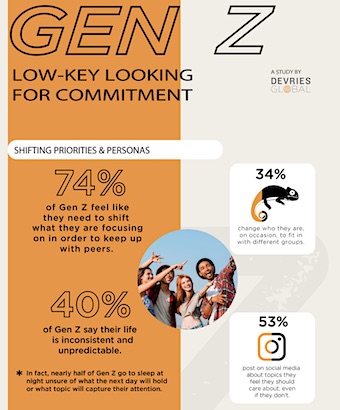 |
Gen Z may be turning constant change into a way of life, but when it comes to their relationships with brands, they’re looking for a little stability, according to a study conducted by DeVries Global.
About three out of four Gen Z respondents (born between 1995 and 2015) say that they shift what they are thinking about or focusing on to keep up with what’s going on the world around them. More than half (53 percent) say they have more than one profile on some social media accounts, with about one in six adding that they are not consistent in how they portray themselves on social media.
Nearly half (49 percent) say they go to bed with no idea what the next day will hold, resulting in 40 percent calling their lives inconsistent and unpredictable. That uncertainty appears to be leading to higher levels of stress, with 63 percent of respondents saying they are either very or extremely nervous about their personal future—a higher number than for any other generation.
 Enlarge infographic Enlarge infographic |
While these traits have led to claims that Gen Z cannot commit to anything and is lacking in loyalty, the study found that the opposite is often true.
Likely in response to the uncertainty surrounding them, Gen Z respondents put a premium on consistency and familiarity when it comes to brands. Almost seven in ten (69 percent) said they find comfort in the familiar, with 85 percent saying they prefer to buy from familiar brands over those that are new or non-mainstream. Only value outranked familiarity as a factor influencing purchase decisions.
Once they’ve formed a relationship with a brand, many Gen Zers find breaking up hard to do. More than three quarters (76 percent) say they are loyal to brands, and 51 percent say they are currently committed to at least one brand.
They also want brand commitment to be a two-way street. Reliability is the top thing Gen Z respondents said they are looking for from a brand, topping design, respect, fun and intelligence.
But it seems that companies are dropping the ball with regard to capitalizing on that loyalty. Just three sectors—tech, snack foods and restaurants—were judged as understanding Gen Z by more than half of respondents.
The study provides some pointers for brands that want to make a connection with Gen Z. Making sure you have a strong YouTube presence should be top of mind. Other important strategies include getting people to start talking about your brand, and ensuring that your executives talk in a language that Gen Z will understand and appreciate.
The DeVries Global survey was conducted from July 2019 through the fall. It included 1,193 Gen Z respondents and 1,277 consumers in other generations for comparative purposes.


 Consumers who once demanded convenience now require consistent, multi-channel experiences that cater to them at every point. Brands must have a clear, audience-appropriate, and channel-specific voice across all platforms.
Consumers who once demanded convenience now require consistent, multi-channel experiences that cater to them at every point. Brands must have a clear, audience-appropriate, and channel-specific voice across all platforms. Employees at U.S. companies are experiencing high levels of burnout, but managers are lagging behind when it comes to their awareness of the problem
Employees at U.S. companies are experiencing high levels of burnout, but managers are lagging behind when it comes to their awareness of the problem Brand has a powerful effect on a company’s valuation, but the level of brand understanding in the investment community leaves a lot to be desired, according to a new study from Brodeur Partners, Interbrand and NewtonX.
Brand has a powerful effect on a company’s valuation, but the level of brand understanding in the investment community leaves a lot to be desired, according to a new study from Brodeur Partners, Interbrand and NewtonX. AI may still be viewed with a wary eye by most media pros, but its use is growing, according to a new study from Muck Rack.
AI may still be viewed with a wary eye by most media pros, but its use is growing, according to a new study from Muck Rack. A new study from Walker Sands says that some marketers have been putting the cart before the horse when it comes to the relationship between marketing channels and business outcomes.
A new study from Walker Sands says that some marketers have been putting the cart before the horse when it comes to the relationship between marketing channels and business outcomes.


 Have a comment? Send it to
Have a comment? Send it to 
No comments have been submitted for this story yet.